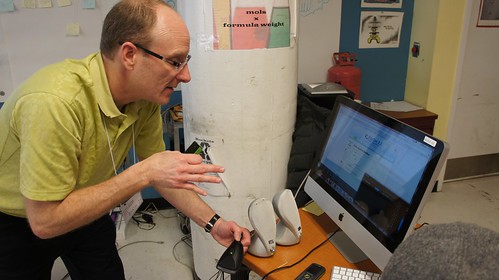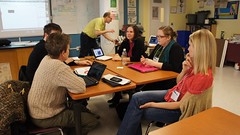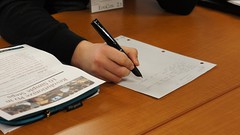It is Monday morning and as I drive to work, my mind is racing trying to make sense of the key themes and ideas from Educon2.3. How will this conference change my thinking? Where do I go next? How will this impact my students? How has this network educators from not only my own province, but across the globe changed my own ideas about teaching?
On the radio, I listen to CBC updating the world about Egyptian protesters who are holding huge rallies in Cairo and other cities as they step up their efforts to force President Hosni Mubarak from power.

(This pictures is @Roddlucier communicating with our online learners during our session)
I reflect my key learning from #educon2.3 – that there was clearly a common theme of networking and sharing in every session, table conversation, social gathering and hallway talk. Over and over we referred to students as “our learners” and our colleagues as “our PLN”. We talk of learning as though it has no boundaries and we model this through our vast network of expertise that allows us to customize our own learning.
Again, my mind focuses back to the radio.
“One demonstrator, Tarek Shalabi, told the BBC that groups were camped out in tents or sleeping out in the square, and described the atmosphere as “overwhelming”.
“We’re here because we want to make a statement. We’re not going until Mubarak steps down,” he said.
I think about Educon, and boundaries – that the boundaries of Schools, Districts (public/private), Cities, Provinces, States, Countries were becoming irrelevant. That there was a common language of learning that revolved around themes of inquiry, of problem solving, connectivity, critical thinking, experiential learning, engagement and of course, FUN.
My mind shifts back to the CBC reporter who quotes Jack Layton (an NDP leader),
“Ultimately of course these things are up to the Egyptian people, but it seems quite clear that significant change is what is being sought by people in Egypt right now, and so let’s make sure that that process is democratic as much as that can possibly be achieved
Read more
As I drive to work, with my lessons ready to go, I feel a strong connection to my experience at #educon2.3 with the current news story that I hear on the radio. Our boundaries, our borders are concepts. Distance and time are now irrelevant. As world citizens, teachers, learners, it is our obligation to be aware, to advocate, to speak out for human rights and to listen closely to the people of Egypt.
I can’t teach my planned lesson.
 As a classroom teacher, I would not let this go. I would want my students to engage in conversation, to analyze and synthesis the news stories, to compare perspective and opinions. I would want them to understand why the front of the newspapers show burning buildings, why they hear words like “revolution”, “dictatorship”, “democracy” and “human rights” on the radio. I would want them to connect this to their own lives and why it matters.
As a classroom teacher, I would not let this go. I would want my students to engage in conversation, to analyze and synthesis the news stories, to compare perspective and opinions. I would want them to understand why the front of the newspapers show burning buildings, why they hear words like “revolution”, “dictatorship”, “democracy” and “human rights” on the radio. I would want them to connect this to their own lives and why it matters.
This is what we talk about at Educon2.3 – Making learning authentic and meaningful. Providing learning that uses current tools and methods. Connecting students and teachers to the world around them.
My pre-service students and I spent the next four hours discussing authenticity in learning which resulted in some inspiring conversation.
As there contribution to this issue in education, these students worked together to create a series of lessons relating to these current news events.
LESSONS HERE (and more to come)
 This past weekend, I had the opportunity to facilitate a conversation at #educon23 in Philidealphia with Rodd Lucier (thecleversheep).
This past weekend, I had the opportunity to facilitate a conversation at #educon23 in Philidealphia with Rodd Lucier (thecleversheep).




 As a classroom teacher, I would not let this go. I would want my students to engage in conversation, to analyze and synthesis the news stories, to compare perspective and opinions. I would want them to understand why the front of the newspapers show burning buildings, why they hear words like “revolution”, “dictatorship”, “democracy” and “human rights” on the radio. I would want them to connect this to their own lives and why it matters.
As a classroom teacher, I would not let this go. I would want my students to engage in conversation, to analyze and synthesis the news stories, to compare perspective and opinions. I would want them to understand why the front of the newspapers show burning buildings, why they hear words like “revolution”, “dictatorship”, “democracy” and “human rights” on the radio. I would want them to connect this to their own lives and why it matters.